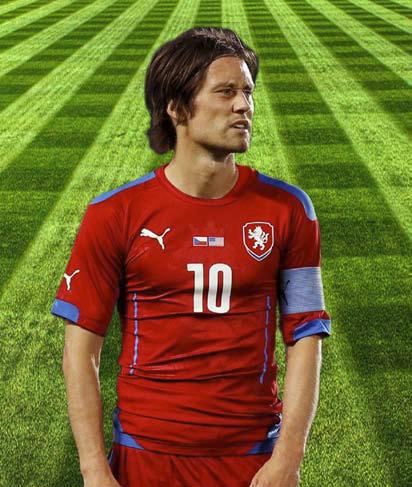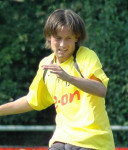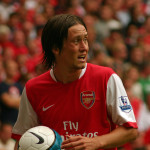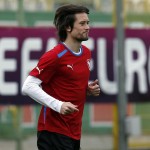Tomáš Rosický: a great talent, known for world class skills and overly fragile muscles that have influenced his career
Central midfielder, right winger, playmaker, attacking midfielder. Tomáš Rosický has always stood out for his versatility in the central part of the pitch, and his ability to play in all roles in midfield with good results thanks to extraordinary vision, combined with world class individual technique. Long balls with pinpoint accuracy able to place teammates in the best positions to hit the back of the net, but also his ability to dribble and beat players and head towards the goal. It is no coincidence that over the course of his career he has earned the nickname of “little Mozart”, comparing his talent to that of the greatest composer of all time. A talent among the best in the world, yet also one who has never managed to achieve his full potential because of a “glass” physique, which too often forced him to stay away from the playing fields. It has been a constant factor in his path as a professional, that has prevented him from making the definitive leap to the highest level and reach his full potential.
Tomáš Rosický was born on the banks of the Vltava River in Prague on October the 4th, 1980. He began to kick his first footballs at a very early age, on the advice of father Jiří, a former Sparta Prague player. It was his father who brought little Tomáš to TJ Kompresory, the club now called Bohemians Praha.
 At the age of eight he made it into the Sparta youth team. The above-average quality of small Tomáš was evident, and he skipped the youth sector steps by eventually debutting in the first team shirt already at the age of 17. He slowly worked his way up the ranks to into the starting eleven, winning two championships in a row (1999 and 2000) and proving to be one of the most promising youngsters even at an international level. On February the 23rd, 2000, the first call from the national team arrived, with coach Jozef Chovanec who gave him his first cap in a friendly match in Dublin against Ireland. His name soon came under the radar of scouts from Europe’s top clubs, who appreciated his technical and tactical qualities. Borussia Dortmund pursued him for a long time, before delivering the decisive blow on January the 9th, 2001. Having 41 appearances and 9 goals with Sparta behind him, Rosický moved to Germany for 14.5 million Euros.
At the age of eight he made it into the Sparta youth team. The above-average quality of small Tomáš was evident, and he skipped the youth sector steps by eventually debutting in the first team shirt already at the age of 17. He slowly worked his way up the ranks to into the starting eleven, winning two championships in a row (1999 and 2000) and proving to be one of the most promising youngsters even at an international level. On February the 23rd, 2000, the first call from the national team arrived, with coach Jozef Chovanec who gave him his first cap in a friendly match in Dublin against Ireland. His name soon came under the radar of scouts from Europe’s top clubs, who appreciated his technical and tactical qualities. Borussia Dortmund pursued him for a long time, before delivering the decisive blow on January the 9th, 2001. Having 41 appearances and 9 goals with Sparta behind him, Rosický moved to Germany for 14.5 million Euros.
The German journalists and fans, who saw him as being skinny, soon took to calling him “Schnitzel”, i.e. cutlet, a nickname that implied a suggestion for him to eat more and to bulk up.
The Czech champion, who for the record, had always hated the nickname, still did not fail to live up to expectations in the Teutonic land, where he finally reached his potential. With Die Schwarzgelben (The Black and Yellows), he won the third title of his career, the sixth “Meisterschale” of the club’s history, before wearing the colours of the Gunners – Arsenal.
The French coach Arsène Wenger, famous for his great nose for future talent, managed to seize him from the German club, and entrust him with a key role on his tactical chessboard.
It was in England where his definitive consecration arrived, with the first year ending with a total of 26 appearances, 3 goals and an industrial quantity of assists for his teammates. However, the following year, after a good start, the long ordeal began. On February the 1st, he felt a crack in his left knee. A real blow to the heart for both his fans, who had to lose their most creative player at his peak in form, and for him, since he was forced to miss Euro 2008 with the national team. Rosický remained on the sidelines for 434 days, without playing a single minute in 2008-2009. The following season did not begin in the best way. On August the 4th, just before the start of the Premier League, the Czech player was struck by a muscle problem, which kept him out until mid-September. From then on, he collected 33 appearances, scoring 3 goals. The following season, Rosický managed to get into excellent physical condition, and achieve a continuity that was lacking since his time at Borussia Dortmund. He was used on a regular basis, but just when everything seemed to be going smoothly, he got yet another a injury, this time the rupture of his Achilles tendon and a subsequent operation. The physiotherapy lasted 160 days. In the next two years, he was struck by several muscle injuries, which forced him to miss 15 games before the umpteenth ordeal. At the end of year 2014-21015 he felt a crack in his left knee again, which forced Tomáš into a having more surgery. The Prague footballer underwent all the procedures of physio in order to return to the pitch as soon as possible. It took some time before he was able to get back to smelling the grass at the Emirates Stadium.
Despite the many injuries which occurred, Arsène Wenger has always held him in high esteem, while supporting him throughout the darkest moments of his career, and urging him not to give up despite an overly fragile physique. “He is a real Arsenal-man, because he has been here a long time. He really is the player who best represents our idea of football, being a team player, possessing pace, a quick brain and a good understanding of the game. And I always want him in my squad, I love his qualities”. A really important sign of esteem for the Czech footballer.
Rosický has participated in the last two years, until the recent physical setbacks, in the amazing journey of the Czech national team to the European Championships in France 2016. Just like Wenger, also the coach of the Czech team, Pavel Vrba has expressed his great appreciation for the playmaker on several occasions. “When people ask me the starting lineup, I always answer that the only one certain to enter the field is Tomáš Rosický”. A guarantee, a certainty you can rely on in any moment. The extraordinary path of the Czech squad began on September 9, 2014, with the pleasant surprise of a home victory against the Netherlands. From then on, the formation of Vrba, managed to put together a series of three consecutive victories, including two away wins against Turkey and Kazakhstan, before a disappointing draw with Latvia. On June 12, the first defeat arrived on the field of the surprise of the qualification – Iceland. It was the last misstep before qualifying, which was achieved due to the following victories. The Czech national team could therefore play again in a European Championship, after the previous appearance in 2012 in Poland and Ukraine, where they admirably made it out of their group, before losing to the Cristiano Ronaldo-led Portugal side. Rosický was there to defend his country’s colours. Fans in particular, hoped to recover this extraordinary player, who on the occasion of the match in Iceland, reached his 100th appearance in the shirt of the Lion badge. A 15 year journey, which started in Dublin back in 2001, and continued thanks to the great spirit of sacrifice of Tomáš, who is ready to get up after every fall.
by Alessandro De Felice








